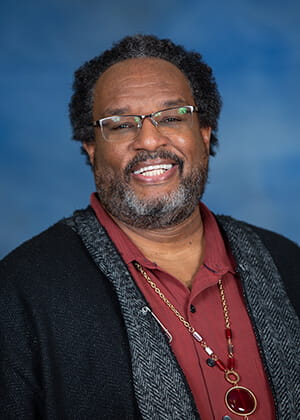
Dr. Ragsdale has a 27-year history that illustrates his passion about combining clinical psychology, community activism and working with families in the study of health disparities. It is part of his path to creating equity. In 2000, he earned his PhD in Clinical Psychology with his dissertation on “African American Identity, Experience with Racism, and Meaning in Life Among Black College Students.” He then became project director and research associate on a $1.4 million grant from the National Institute of Mental Health, “Risky Contexts and Exposure to Violence in Urban Youth,” which explored the experiences of 300 Black children across 6 elementary schools in Chicago. In 2002, Dr. Ragsdale was one of the early recipients to receive a two-year award from NIH, National Minority Health and Health Disparities Institute, to continue his focus on African American and trauma exposures.
Always wanting to gain a deeper understanding, he submitted a grant to host a focus group with low-income Black youth who had been exposed to community violence. From listening to community participants, he uncovered forms of different responses to intercommunal violence in children’s and families’ lived experiences that other researchers had not considered.
“Instead of coming into a community and theorizing about what is going wrong,” he says, “you have to listen to community members speak, because they are the experts on their own lives.”
That is just one of many experiences he has shared with students since joining the Walden faculty more than 14 years ago. Other experiences include working with White families who adopt children of color as well as working with loved ones of Blacks falsely accused, tortured and imprisoned. He uses these experiences to urge his students to help disadvantaged populations.
His focus on students has taken many forms at Walden, including dissertation chair, cross-functional team leader and now as one of the directors in the Office of Academic Research, Progress and Completion. He has also helped prepare students for internships, research and careers. “Writing and developing oral communication skills are central to becoming a psychologist,” he says. “Psychological reports, for example, are dynamic documents that can have a tremendous impact on the life of a client.”
Dr. Ragsdale feels a connection to his students because of their passion for psychology and making a difference—and their shared experience as adult learners. “I went back to school when I was 35. I felt out of place, fearful about math, fearful about my writing and fearful if I would belong,” he says. “I feel a great affinity with Walden students because I see myself in them.”
From that experience and from listening to his students, he knows that their families play an important role in their success. He recommends that doctoral students share not just the challenges, but also the positives of what they are learning. “Everyone knows how hard getting a PhD can be,” he says. “When family members and friends get to experience the joy, it helps them support the student.”
They will need that support for the challenges and opportunities they will encounter in their careers too, he says. “I often tell my students that their future in psychology will be very different from mine. If you would have told me that I would be teaching and become a thought leader and administrator at a distance-learning institution that focuses on positive social change, I would not have believed it, because it didn’t exist in my mind. We have to greet the future with belief, bravery, support and perseverance.”



